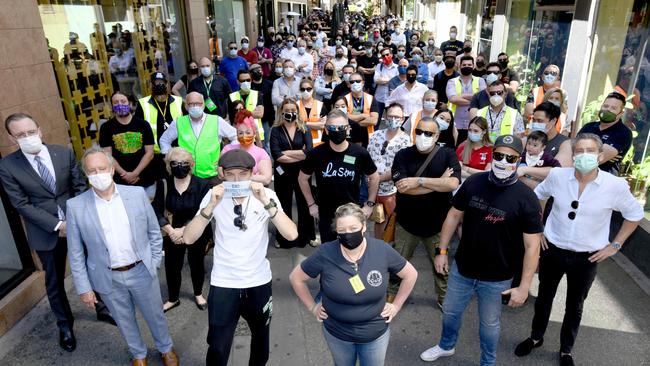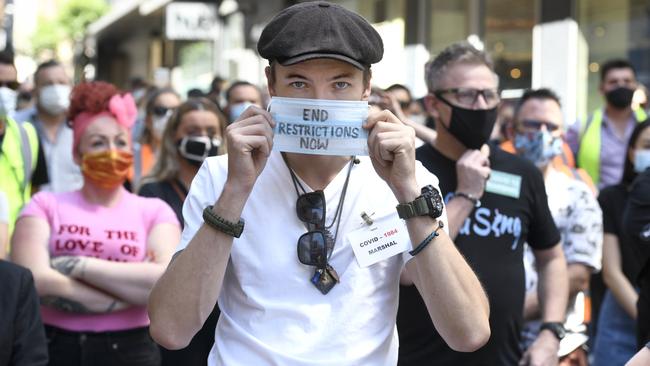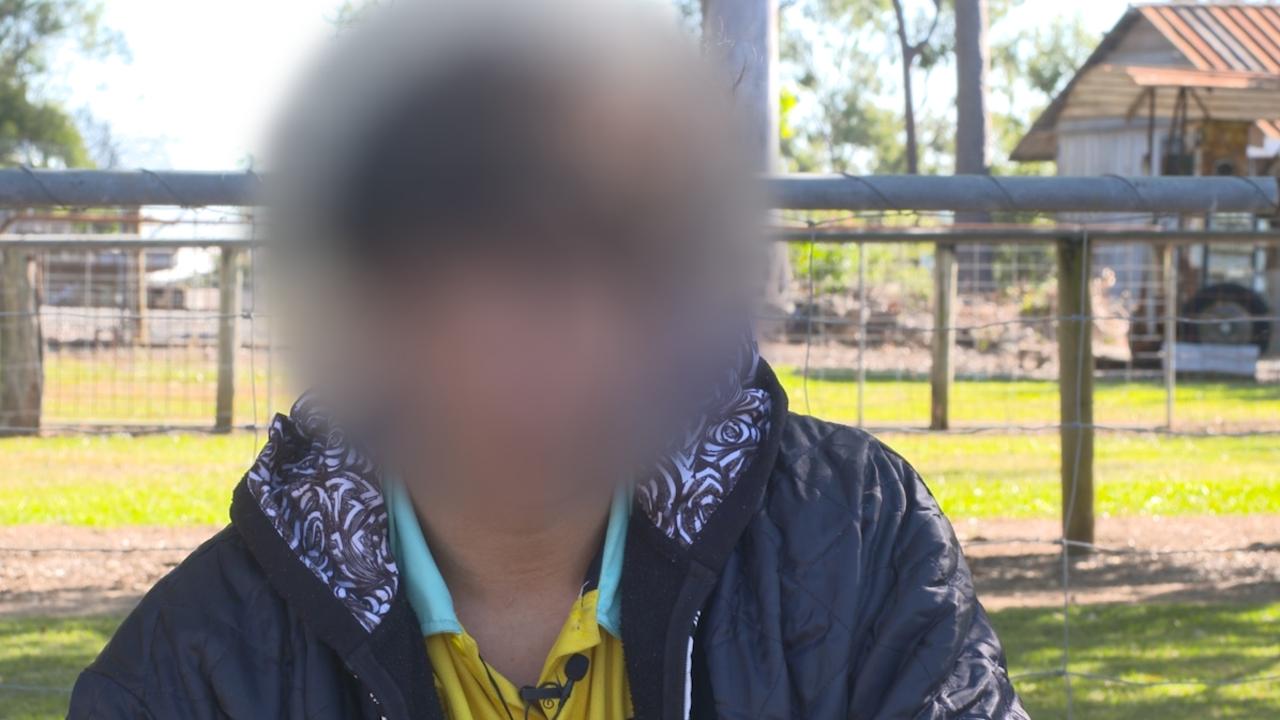Capacity limits push Adelaide hospitality venues to brink of collapse, as staff call for end of 1-in-4 sq m rule
The leaders of the pandemic response are about to meet again, and these dozens of hospitality staff have an urgent message for them – ease venue limits today.

Coronavirus
Don't miss out on the headlines from Coronavirus. Followed categories will be added to My News.
The hospitality sector is pleading with state leaders to ease venue capacity limits on Friday, saying prolonged restrictions have created a perfect storm that is sinking trade and threatening livelihoods.
The state’s Transition Committee meets on Friday to map out the next moves in the health and economic response to the pandemic.
Dozens of hospitality heavyweights gathered in city laneway Peel Street on Thursday to call for an immediate return to the one person per 2sq m rule, instead of one per 4sq m.
They also argued the State Government’s work-from-home directive was excessive and fuelling more fear.
Premier Steven Marshall said the committee would continue to follow expert health advice.
The Duke of Brunswick Hotel publican Simone Douglas said “the next 72 hours” were crucial for the state’s hospitality industry.
“We are in the perfect storm of all of us having taken on a personal debt load through the Federal Government guaranteed cash boost loans, with repayments falling due in time for Christmas,” she said.
“Our cash reserves were laid bare through the lockdown we had to have and the JobKeeper we cannot access, thanks to two months of reasonable trade.
“The human cost – mentally and emotionally – is unimaginable. We aren’t asking for a handout or a hand-up, just a fair go so we can perhaps limp through a period which normally generates 50 per cent of a business’s trade for the year.”

Craig Basford, co-owner of Big Shed Brewing, said his business’s biggest issue was the lack of clarity over restrictions.
“The perfect example was Monday afternoon, when rules around private functions were meant to change on the Tuesday, and two of us ring the COVID hotline and get two different answers,” he said. “It just feels like a lack of planning, a lack in transparency and lack in consistency.”
Simon Kardachi, who owns 10 restaurants in the CBD, said the one in 4sq m rule had “crucified the city”.
But his biggest concern was the government’s directive for people to continue working from home – something he said instilled more fear than was necessary.
“At Shobosho, they’d normally do 100 people for lunch,” he said. “Today they did eight.
“One in 4sq m is a disgrace. One in 2sq m will help ... but sadly, even if they go one in 2sq m, if they don’t say ‘go back to work’, it’s not going to help the city.
“It’s inconceivable that people who run the state and run the economy can’t get a grasp of this.”
The government on Tuesday introduced a QR code system to better track people’s visits to venues and shops.
But Enzo Fantasia, of Aces Bar & Bistro in the Adelaide Central Market Plaza, said capacity limits still had a devastating effect on trade.
“Eighty per cent of our turnover here is on Friday and Saturday nights, but when you go from 120 people down to 31, it becomes increasingly difficult to make ends meet,” he said.
“Nobody has caught anything from coming into a pub or restaurant.
“It’s just an overkill.” He said his bistro had more than 200 cancellations in the past fortnight.
“The sooner there’s an announcement made (to go back to one in 2sq m), the sooner people hopefully will rebook,” he said.
Mr Marshall maintained his stance that the committee needed to rely on expert health advice but noted the state appeared to be on top of the Parafield cluster that instigated last month’s lockdown.
“We don’t want to keep the restrictions in a single day longer than we need to,” Mr Marshall said.
He said he absolutely understood the concerns of businesses.
“I feel for every individual, family and business affected by the coronavirus throughout South Australia, but listening to the health advice has kept our state safe and our economy strong,” he said.
“ We will not be stepping in making political decisions, because I’ve seen that in other parts of the world and it has had disastrous consequences.”



